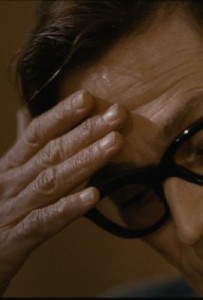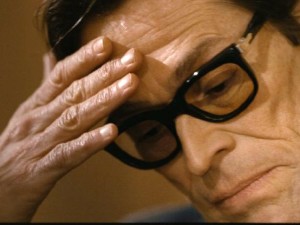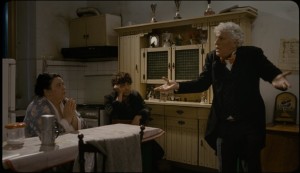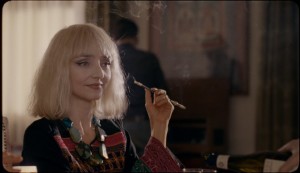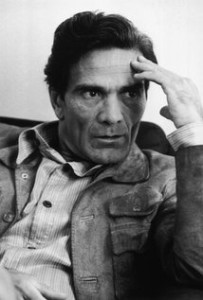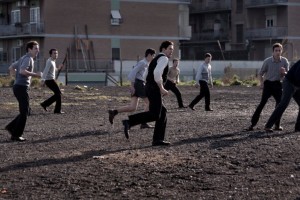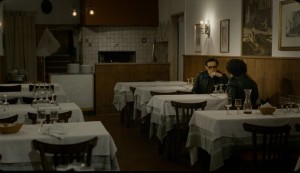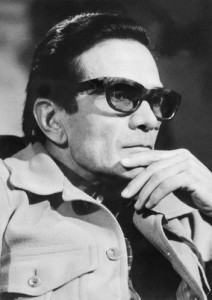Pasolini **** (2014, Willem Dafoe, Riccardo Scamarcio, Ninetto Davoli, Maria de Medeiros, Adriana Asti) – Movie Review
Director Abel Ferrara’s inventive and disturbing film is an impressionistic kaleidoscopic look at the events of the last day in the life of the controversial and provocative gay Italian film-maker Pier Paolo Pasolini in 1975. Like it subject, the film is both extremely frank and elegant.
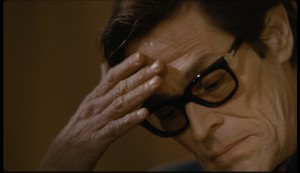
Willem Dafoe really goes for it, and is extraordinary in the main role of Pasolini, even managing to look like him and seem Italian. Dafoe, in his fourth collaboration with Ferrara, wears some of Pasolini’s clothes and his glasses, using his personal objects and even furniture.
Dafoe says the film is not a biopic and he doesn’t ‘play’ Pasolini:’ We imagine his state of mind on the last day of his life. So the performance was not an imitation or interpretation of who he was, but more a record of me inhabiting the actions and thoughts of a man who happened to be Pier Paolo Pasolini.’
Ferrara really goes for it, too, and also comes up with an extraordinary film, intelligent, poetic and informative, though clarity isn’t intended to be its main point. The screenplay is written by Maurizio Braucci (Gomorrah), based on an idea by Ferrara and Nicola Tranquillano. Ferrara spoke to relatives and friends, and interviewed Giuseppe (Pino) Pelosi, the rent boy jailed for the murder when he was 17.
It’s not a conventional narrative film, more one of mood, atmosphere, feelings and ideas. Real events are intercut with imaginary scenes from an unmade Pasolini film, Porno-Teo-Kolossal, to paint a portrait of the artist as a fearless intellectual attracted to street boys. Some of it is clear, but some of it is mystifying, even after a much-needed second viewing. It’s hard to say exactly what Ferrara wants to say, perhaps many things, different and even conflicting.
Pasolini was complex, not entirely clear, as his interview with a reporter shows, and the film does justice to that, as well as to its subject. Although admittedly its narrative runs for just a single day, the film could have been much longer than its gripping 84 minutes. There’s plenty of room for another, more Wikipedic film about Pasolini, but this one will do very well for the time being.
Ninetto Davoli, who makes an iconic, poignant appearance as Epifanio, acted in many of Pasolini‘s films and was his lover. He is also a character in the film, played by Riccardo Scamarcio.
Maria de Medeiros plays Pasolini’s friend and regular actress Laura Betti. With little screen time, Adriana Asti is outstanding as Pasolini’s mother Susanna, with whom he lives in bourgeois comfort. The brief scenes in Pasolini’s home as he relaxes with his paper or over lunch, enjoying time with family and friends, working on his next screenplay and novel, are warm, calm and quietly affecting. It’s a portrait of pleasant ordinariness, a good life that is about to be senselessly shattered by homophobic young men.
Given the opposition of the Italian establishment to Pasolini in the Seventies, it is interesting to note Italian cultural and tax haven support for this film.
Pasolini was murdered, aged 53, on 2 November 1975 on a beach at Ostia, Rome, in still-mysterious circumstances shortly after completing the notorious Salò, or the 120 Days of Sodom (1975). The film, however, provides its own brutal and graphic account of the homicide. The case is still open, despite a conviction, and many theories and conspiracy ideas continue to circulate. Whatever the truth, it was an important life cut short and Pasolini is a gay saint and martyr.
© Derek Winnert 2015 Movie Review
Check out more reviews on http://derekwinnert.com

